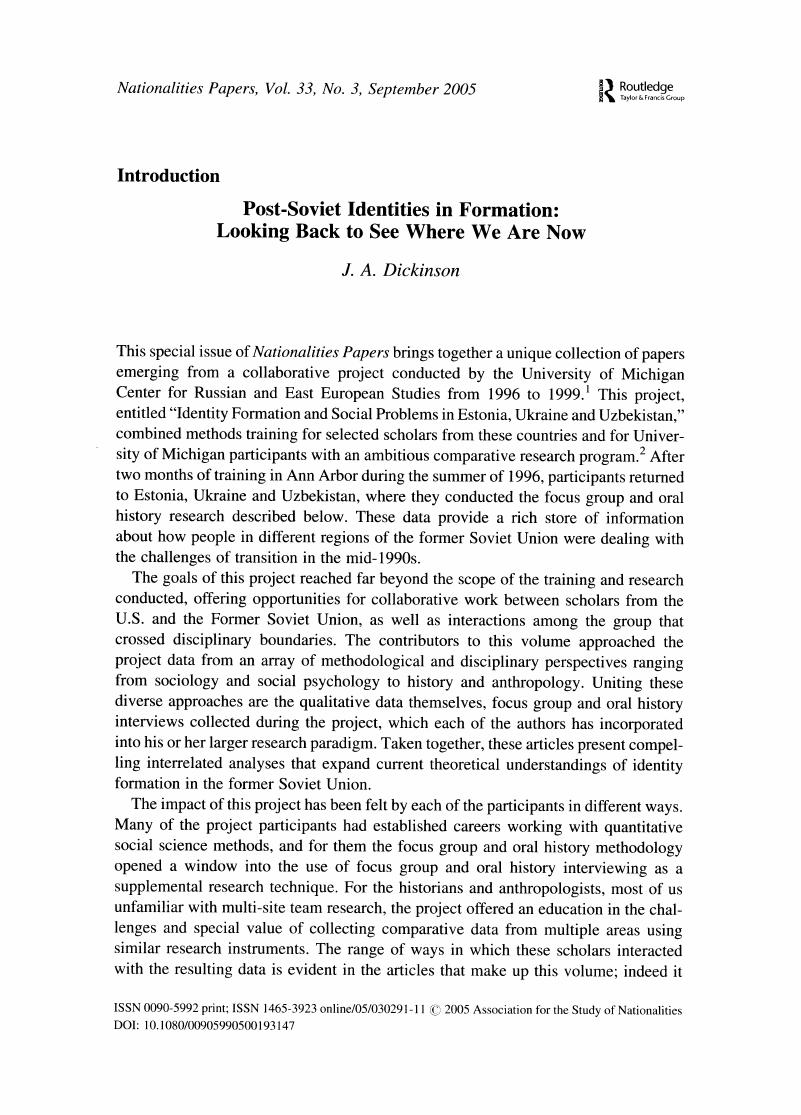No CrossRef data available.
Article contents
Post-Soviet Identities in Formation: Looking Back to See Where We Are Now
Published online by Cambridge University Press: 20 November 2018
Abstract

- Type
- Introduction
- Information
- Nationalities Papers , Volume 33 , Issue 3: Special Issue: Identity Formation and Social Problems in Estonia, Ukraine and Uzbekistan , September 2005 , pp. 291 - 301
- Copyright
- Copyright © 2005 Association for the Study of Nationalities
References
Notes
1. “Identity Formation and Social Problems in Estonia, Ukraine, and Uzbekistan,” a project of the University of Michigan Center for Russian and East European Studies, was supported by Ford Foundation Grant No. 950-1163 (Project Director: Michael D. Kennedy), 1 September 1995 to 31 March 1999; additional research support for supplementary focus group and oral history interviews, and for translation of materials from these related projects was provided by a contract from the National Council for Soviet and East European Research (NCSEER), Contract No. 812-11 (Project Director: Michael D. Kennedy) 1 November 1996 to 31 July 1997. The National Council for Soviet and East European Research, however, is not responsible for the contents or findings presented in these papers.Google Scholar
2. The editors of this volume would like to thank Michael Kennedy, Director of the International Institute at the University of Michigan for his directorship of this project, as well as Donna Parmelee, from the University of Michigan Center for Russian and East European Studies, for her extensive administrative support of the activities associated with this project.Google Scholar
3. Janet Hart of the University of Michigan designed and coordinated the qualitative methods course and David L. Morgan of Portland State University conducted the focus group training.Google Scholar
4. See Michael Kennedy, Cultural Formations of Post-Communism: Emancipation, Transition, Nation and War (Minneapolis: University of Minnesota Press, 2002), pp. 304–7 for a template of the focus group interview schedule.Google Scholar
5. This volume.Google Scholar
6. See, for example, the following: Kennedy, Cultural Formations of Post-Communism; Michael Kennedy, “The Spatial Articulation of Identity and Social Issues: Estonia, Ukraine and Uzbekistan through Focus Groups,” in Kimitaka Matuzato, ed. Regions: A Prism to View the Slavic–Eurasian World. Towards a Discipline of “Regionology” (Sapporo: Slavic Research Center, 2000); Ted Hopf, “Making the Future Inevitable: Legitimizing, Stabilizing and Naturalizing the Transition in Estonia, Ukraine, and Uzbekistan,” European Journal of International Relations, Vol. 8, No. 3, 2002, pp. 403–436.Google Scholar
7. Kennedy, Cultural Formations of Post-Communism , p. 161.Google Scholar
8. The necessity of segregating men and women for Uzbek focus groups further required similar separation in the other research sites to ensure comparability.Google Scholar
9. A supplemental grant was awarded to Victor Susak at the Institute for Historical Research in Lviv to conduct five additional oral histories beyond the initial five planned for the project.Google Scholar


